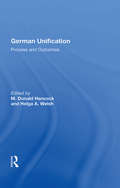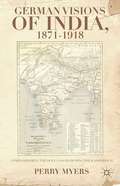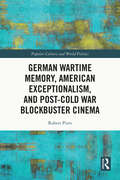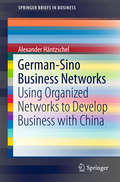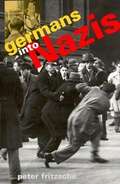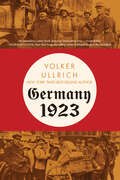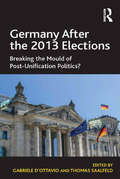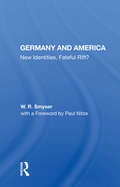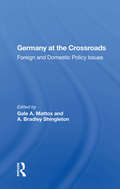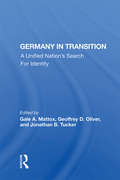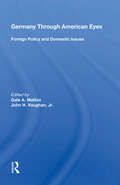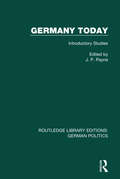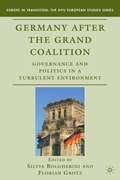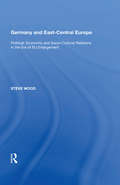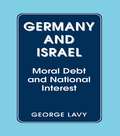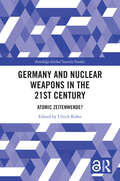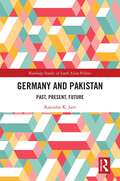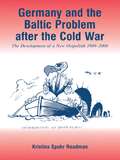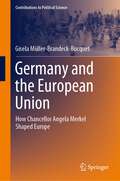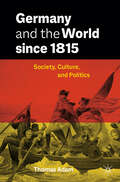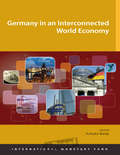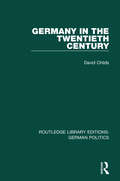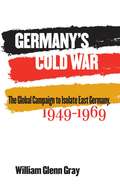- Table View
- List View
German Unification: Process And Outcomes
by M. Donald HancockThe East European revolutions of 1989 led to momentous changes throughout the region. Nowhere were they felt more dramatically than in Germany, where unification unexpectedly became reality, unfolding with breathtaking speed, unhindered by major obstacles. However, joy over the fall of the Berlin Wall and the opening of the borders was soon dampene
German Visions of India, 1871–1918
by Perry MyersThe wide-ranging fascination with India in Wilhelmine Germany emerged during a time of extraordinary cultural and political tensions. This study shows how religious (denominational and spiritual) dilemmas, political agendas, and shifting social consensus became inextricably entangled in the wider German encounter with India during the Kaiserreich.
German Wartime Memory, American Exceptionalism, and Post-Cold War Blockbuster Cinema (Popular Culture and World Politics)
by Robert PirroThis book excavates the diverse and mostly unnoticed political meanings made available to American and German audiences by the blockbuster films helmed by transplanted West German directors Roland Emmerich and Wolfgang Petersen.Through formal film analysis, broad consideration of American and German film criticism, and reflection on relevant political developments of the post-Cold War era, the book reveals how traces of Germany’s experience of dictatorship and wartime destruction find inadvertent cinematic expression in ways that helped American and German moviegoers find orientation in the changed political and cultural landscape of a newly globalized world. To complement and deepen the analysis of the Hollywood output of Emmerich and Petersen, the book juxtaposes the creative product of these transplanted directors to examples of a converse cinematic phenomenon considered under the label, American Babelsberg, which encompasses World War Two-themed films shot by American directors in Germany utilizing the production facilities at Babelsberg. Focus here is placed particularly on two high-profile cinematic releases of the aughts, Valkyrie (2008), and Inglourious Basterds (2009). The magnetic attraction to, or nettlesome burden of, World War Two memories on these directors of American Babelsberg and German Hollywood is explained in this book by the entwined histories of Germans and Americans, the different challenges of national self-definition and renewal they faced in the post-Cold War world, and their long-standing and ongoing transatlantic discourse of political ideas and cultural ideals.This book will be of great interest to students and scholars of film studies, politics, popular culture, and contemporary history.
German, Jew, Muslim, Gay: The Life and Times of Hugo Marcus (Religion, Culture, and Public Life)
by Marc David BaerHugo Marcus (1880–1966) was a man of many names and many identities. Born a German Jew, he converted to Islam and took the name Hamid, becoming one of the most prominent Muslims in Germany prior to World War II. He was renamed Israel by the Nazis and sent to the Sachsenhausen concentration camp before escaping to Switzerland. He was a gay man who never called himself gay but fought for homosexual rights and wrote queer fiction under the pen name Hans Alienus during his decades of exile.In German, Jew, Muslim, Gay, Marc David Baer uses Marcus’s life and work to shed new light on a striking range of subjects, including German Jewish history and anti-Semitism, Islam in Europe, Muslim-Jewish relations, and the history of the gay rights struggle. Baer explores how Marcus created a unique synthesis of German, gay, and Muslim identity that positioned Johann Wolfgang von Goethe as an intellectual and spiritual model. Marcus’s life offers a new perspective on sexuality and on competing conceptions of gay identity in the multilayered world of interwar and postwar Europe. His unconventional story reveals new aspects of the interconnected histories of Jewish and Muslim individuals and communities, including Muslim responses to Nazism and Muslim experiences of the Holocaust. An intellectual biography of an exceptional yet little-known figure, German, Jew, Muslim, Gay illuminates the complexities of twentieth-century Europe’s religious, sexual, and cultural politics.
German-Sino Business Networks
by Alexander HäntzschelIn this book, Alexander Häntzschel presents the benefits of organized networks and provides a first-ever overview of German-Sino business networks. Based on more than 20 expert interviews and research of 30 different cases, the analysis covers the different forms of organization, their target groups and members, services and activities, and accessibility and membership fees. Complementary to the analysis, the results of a survey bring forward the experiences and expectations of professionals involved in such networks. With this Springer Brief, business professionals get a quick and useful overview of the leading networks such as the German Asia-Pacific Business Association, the German-Chinese Business Association, and the Asian Social Business Community.
Germans into Nazis
by Peter FritzscheIn this dramatically plotted book, organized around crucial turning points in 1914, 1918, and 1933, Peter Fritzsche explains why the Nazis were so popular and what was behind the political choice made by the German people.
Germany 1923: Hyperinflation, Hitler's Putsch, And Democracy In Crisis
by Volker UllrichFrom the New York Times best-selling historian comes a gripping account of the crisis of the Weimar Republic, when hyperinflation and political upheaval threatened to unravel a new experiment in democracy. As the great Austrian writer Stefan Zweig confided in his autobiography, written in exile, “I have a pretty thorough knowledge of history, but never, to my recollection, has it produced such madness in such gigantic proportions.” He was referring to the situation in Germany in 1923. It was a “year of lunacy,” defined by hyperinflation, a political system on the verge of collapse, and separatist movements that threatened Germany’s territorial integrity. Most significantly, Adolf Hitler launched his infamous Beer Hall Putsch in Munich—a failed coup that nonetheless drew international attention and demonstrated the Nazis’ ruthless determination to seize power. In Germany 1923, award-winning historian Volker Ullrich draws on letters, memoirs, newspaper articles, and other sources from the time to present a captivating new history of those explosive twelve months. The crisis began when the French invaded the Ruhr Valley in January to force Germany to pay the reparations it owed under the Treaty of Versailles, which had ended the Great War. For years, German leaders had embraced inflationary policies to finance the costs of defeat, and, as Ullrich demonstrates, the invasion utterly destroyed the value of the German mark. Before the war, the exchange rate was 4.2 marks to the dollar. By November 20, 1923, a dollar was worth an incomprehensible 4.2 trillion marks, and a loaf of bread cost 200 billion. Facing the abyss, many ordinary Germans called for a national messiah. Among the figures to vie for that role was Hitler, a thirty-four-year-old veteran who possessed a uniquely malevolent personal magnetism. Although the Nazi coup in November was put down and Hitler arrested, the putsch showed just how tenuous the first German democracy, the Weimar Republic, was at its core. As Ullrich’s panoramic narrative reveals, other Germans responded to the successive crises by launching a cultural revolution: 1923 witnessed the emergence of a multitude of new movements, from Dada to Bauhaus, and of such iconoclasts as Bertolt Brecht, George Grosz, and Franz Kafka. Yet most observers were amazed that the Weimar Republic was able to survive, and the more astute realized that the feral undercurrents unleashed could lead to much worse. Publishing a century after that fateful year, Germany 1923 is a riveting chronicle of one of the most challenging times any modern democracy has faced, one with haunting parallels to our own political moment.
Germany After the 2013 Elections: Breaking the Mould of Post-Unification Politics?
by Gabriele D'Ottavio Thomas SaalfeldThe German election of 2013 has important ramifications for the whole of Europe. Germany After the 2013 Elections: Breaking the Mould of Post-Unification Politics? provides a comprehensive analysis of this election and its wider implications for post-unification German politics. International specialists on German and EU politics examine the domestic and international context of the election and reflect on its possible consequences. In the first part of the volume, a number of contributors analyse the policy environment in which the election took place while the second part deals with voters, parties and leaders’ strategies in the run-up to, and the aftermath, of the 2013 election.
Germany And America: New Identities, Fateful Rift?
by W. R. SmyserThis book shows how Germany and America, the backbone of the Atlantic alliance and of the global system, may split apart. It argues that such a drastic shift would have immense implications for any new world order, dividing, once again, the maritime from the continental powers.
Germany At The Crossroads: Foreign And Domestic Policy Issues
by Gale A. Mattox A. Bradley ShingletonThe incorporation of the German Democratic Republic into the Federal Republic ignited excitement over the prospect of bringing democratic reform and better living conditions to the East but also gave rise to concern over united Germany's ability to do so while maintaining its own economic vitality. This volume examines many of the issues integral t
Germany In Transition: A Unified Nation's Search For Identity
by Jonathan B. Tucker Gale A. Mattox Geoffrey D. OliverThis book focuses on themes ranging from foreign and European affairs, economic and business issues, and eastern Germany to minority rights issues. It contains remarks given before conferences of the Robert Bosch Foundation Alumni Association which focuses on Germany's international role.
Germany Through American Eyes: Foreign Policy And Domestic Issues
by Gale A. Mattox John H. VaughanAs scholars and writers have attested throughout the years, Germany can be a fascinating as well as challenging country in which to study and live. Its geopolitical position in Central Europe has given it significant influence over the course of European history. It has been a country of contradictions and of momentous events that have had tremendous impact on the international community. For the U.S. Fellows in the Robert Bosch Foundation Fellow Program there may be as many reasons for participation in the program as there are Fellows. The program's objective is to give young U.S. professionals experience in German government and industry at an early point in their career. The Robert Bosch Foundation Alumni Association has undertaken to further the goal of U.S.-German relations with this book.
Germany Today: Introductory Studies (Routledge Library Editions: German Politics)
by John P. PayneThis book, originally published in 1971, provides clear analysis of German affairs at the end of the 1960s. Without neglecting the historical dimension of recent developments, it examines some of the problems the German people faced in the post-war years. Written by experts, but nonethless in an accessible style the essays in this book give an insight into the methods of particular disciplines such as history, economics, politics or sociology whilst offering an introduction to many aspects of German life.
Germany after the Grand Coalition
by Silvia Bolgherini Florian GrotzIn Germany, Grand Coalitions of the two major parties - the Christian Democrats (CDU/CSU) and the Social Democrats (SPD) - generally have a bad reputation. Hence, the CDU/CSU-SPD government under Angela Merkel (2005-2009) was neither the parties' nor the citizens' preferred choice, its performance was seen quite critical from the outset, and it was finished without further ado after the 2009 federal election. Has the Grand Coalition 2005-2009 been a single episode or rather a turning point for German politics? This book provides a retrospective of the first Merkel government, an analysis of the 2009 election and an account of its prospective consequences.
Germany and East-Central Europe: Political, Economic and Socio-Cultural Relations in the Era of EU Enlargement
by Steve WoodThis innovative volume analyzes historical, strategic and domestic political influences on the character and dynamics of the European Union's eastern enlargement. Its main focus is on interactions between Germany, Poland, the Czech Republic and Hungary, in political-diplomatic, commercial-economic and socio-cultural fields. The book also examines the wider European and international contexts to show that as enlargement advanced, we also witnessed an increase in the potential for conflict among EU members, old and new. Steve Wood provides an eclectic and topical appraisal, which identifies the German state as the crucial actor in both the enlargement venture and parallel processes of bilateral reconciliation. The book is recommended to those with interests in contemporary Germany, Central and Eastern Europe, and European integration.
Germany and Israel: Moral Debt and National Interest
by George LavyIn 1952, the Federal Republic of West Germany concluded a treaty with Israel whereby the Germans had to pay three billion Deutschmarks in compensation for the Holocaust. However, the Israelis felt that Germany owed Israel a moral as well as a financial debt, and thus expected further aid and protection. Although Germany made several concessions in favour of the Jewish State, particularly in the domain of armament, as Germany's political status increased, its national interest gradually took priority over that of Israel. This book examines the grounds which motivated Germany to grant aid to Israel and the change in their relations as the German economy flourished and gained influence in world affairs.
Germany and Nuclear Weapons in the 21st Century: Atomic Zeitenwende? (Routledge Global Security Studies)
by Ulrich KühnThis book is the first scholarly book to take a comprehensive look at Germany’s nuclear weapons policies in the 21st century.German foreign and security policy is facing a profound reorientation. Great power competition between the United States and both a revanchist Russia and a rising China, the return of war and nuclear threats to Europe, and the emergence of new technologies all force Germany to adapt. German policymakers and scholars increasingly speak of a pivotal Zeitenwende, an epochal turning point in history. How does Germany adapt its nuclear policies to these changing conditions?The volume brings together internationally renowned nuclear scholars and policy analysts from Germany and abroad. Focussing on German nuclear deterrence, arms control and disarmament as well as nonproliferation policies, the contributors assess how German leaders have navigated continuity and change, domestically and abroad. The volume concludes that Germany remains bound by dependence on the United States and its own conservatism. Within these parameters, German leaders have adapted slowly to change and continue to balance seemingly contradictory deterrence and disarmament goals.This book will be of much interest to students of nuclear proliferation, security studies, German politics and International Relations, as well as policymakers.
Germany and Pakistan: Past, Present, Future (Routledge Studies in South Asian Politics)
by Rajendra K. JainThis book explores Germany’s political, economic, defence, nuclear and cultural relations as well as defence cooperation with and arms transfers to Pakistan from 1949 to the present day.Pakistan shares a multidimensional relationship with the Federal Republic of Germany, which is its largest trading partner within the European Union and a significant donor. Drawing on extensive English and German language source material, including declassified documents of the German Foreign Office, this book reveals for the first time details of conversations between Pakistani and German leaders and officials. Filling a long‑felt gap in the available literature on Europe‑South Asia relations, this well‑researched book examines mutual perceptions, the complexity, the elements of convergence and divergence as well as the challenges and prospects of Germany’s relations with Pakistan.This book will be a valuable contribution to the field of International Relations, International History, as well as Pakistan’s and Germany’s foreign policies.
Germany and the Baltic Problem After the Cold War: The Development of a New Ostpolitik, 1989-2000
by Kristina Spohr ReadmanThe root question this book addresses is how the new Germany will use its re-found status as a great power. Does Germany - as in the past - aim to dominate Europe? Or has it renounced its imperial ambitions following the trauma of division during the Cold War?In seeking answers to these questions, Kristina Spohr Readman scrutinises the development of Germany's new Ostpolitik (eastern policy) in the period 1989-2000. Against the background of recent European history, she analyses the re-establishment of a special relationship between Bonn/Berlin and Moscow. In particular, she assesses the peculiar geopolitical situation of the Baltic states: caught between a turbulent Russia in the east and a unified Germany in the west. The Baltic case reveals the complexities of a post-Cold War European security architecture in the making.
Germany and the European Union: How Chancellor Angela Merkel Shaped Europe (Contributions to Political Science)
by Gisela Müller-Brandeck-BocquetThis book aims to present a coherent picture of Germany’s European policy during Merkel’s chancellorship. At the same time, it traces the development of the EU in the period 2005–2021. Accordingly, the European crises and the internal and external threats to the integration community are addressed, as well as the jointly developed solutions. Thus, on the one hand, the book shows what Germany was willing to do for Europe; on the other, it reveals how the EU was able to develop further as the most important point of reference for German politics and power.
Germany and the Politics of Europe's Money
by Karl KaltenthalerAs countries in the European Union struggle to comply with the Maastricht Treaty, the question of monetary integration is at the forefront of European politics. Germany and the Politics of Europe's Money explores how and why Germany--whose economic power makes it a pivotal player in the European monetary system--has developed inconsistent policies toward European monetary institutions and how international institutions affect domestic politics that, in turn, influence state policies toward these institutions.Moving away from state-centered and Marxist approaches to the study of the European monetary integration process, Karl Kaltenthaler offers a new analytical framework to assess the dynamics within and among the participating countries. Using official and unofficial documents as well as interviews with players ranging from presidents of the Bundesbank to functionaries in the trade unions, Kaltenthaler argues that the number of decision makers negotiating policy and their accountability to interest groups, political parties, government ministries, and Germany's central bank have made Germany's fluctuations in policy inevitable. Germany and the Politics of Europe's Money examines twenty years of German policy through an analysis of four key episodes: the creation of the European Monetary System, the creation of the Franco-German Economic and Financial Council, the establishment of policy toward the European Monetary Union, and the institutional transformation of the EMS in the 1990s. It thus brings a new understanding to Germany's dynamic policies and the political forces behind them.
Germany and the World since 1815: Society, Culture, and Politics
by Thomas AdamThis textbook provides a history of modern Germany, locating the country’s social, cultural, and political developments within their proper global and transnational context. The author argues that most developments in German culture, society, and politics throughout the nineteenth and twentieth centuries were caused by wider global and transnational trends. A history of the German people rather than the German state, the book focusses on non-state and non-government actors, intercultural transfers, and applies the approach of ‘thick description’ to analysing the creation of German culture, society, and identity from the era of the Napoleonic wars right up to the present post-unification Germany. This includes an examination of German migrants’ journeys to their new homes in the Americas and, thus, the creation of a global German diaspora with cultural and social networks beyond its home country’s borders. The book further focusses on the transfers that connected German society and culture with those of other countries; for instance, chapters cover the transfer of football from England to Germany, the transfer of the Christmas holiday tradition from Germany to other countries, and the development of eugenics in Germany within its global context.
Germany in an Interconnected World Economy
by Ashoka ModyA report from the International Monetary Fund.
Germany in the Twentieth Century (Routledge Library Editions: German Politics)
by David ChildsThe book traces the development of Germany from the Kaiser’s Reich in the 1870s to the reunited democratic state led by Helmut Kohl in the 1990s. The author begins by countering the popular view of Germany before 1914 as irredeemably reactionary, and after assessing Germany’s part in the First World War, he outlines the rise and fall of the Weimar Republic. The 12 years of Hitler’s destructive experiment are presented in a balanced way as part of the overall development of the country. Germany in defeat is then discussed, as is heer rebirth under Four Power occupation. The last chapters explore the two separate German states and the events leading up to the restoration of German unity.
Germany's Cold War: The Global Campaign to Isolate East Germany, 1949-1969
by William Glenn GrayUsing newly available material from both sides of the Iron Curtain, William Glenn Gray explores West Germany's efforts to prevent international acceptance of East Germany as a legitimate state following World War II. Unwilling to accept the division of their country, West German leaders regarded the German Democratic Republic (GDR) as an illegitimate upstart--a puppet of the occupying Soviet forces. Together with France, Britain, and the United States, West Germany applied political and financial pressure around the globe to ensure that the GDR remain unrecognized by all countries outside the communist camp. Proclamations of ideological solidarity and narrowly targeted bursts of aid gave the GDR momentary leverage in such diverse countries as Egypt, Iraq, Ghana, and Indonesia; yet West Germany's intimidation tactics, coupled with its vastly superior economic resources, blocked any decisive East German breakthrough. Gray argues that Bonn's isolation campaign was dropped not for want of success, but as a result of changes in West German priorities as the struggle against East Germany came to hamper efforts at reconciliation with Israel, Poland, and Yugoslavia--all countries of special relevance to Germany's recent past. Interest in a morally grounded diplomacy, together with the growing conviction that the GDR could no longer be ignored, led to the abandonment of Bonn's effective but outdated efforts to hinder worldwide recognition of the East German regime.
